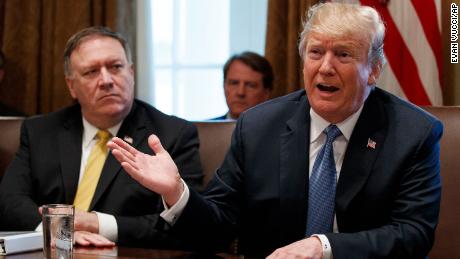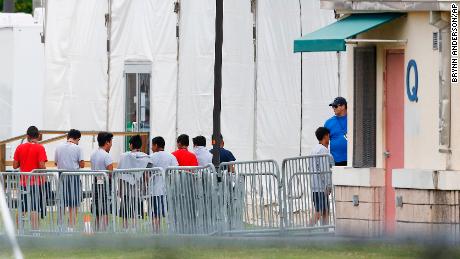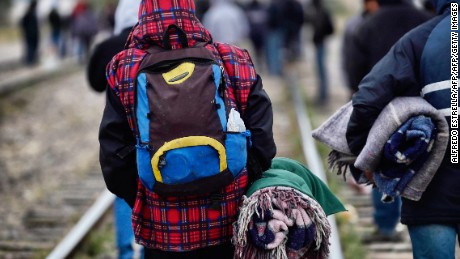Washington (CNN)Nearly 90,000 Hondurans who have lived in the US at least two decades could be forced to leave the country after the Trump administration decided Friday to end protections for the immigrants that go back to the 1990s.
The move brings the total number of immigrants for whom the administration has decided to end temporary protected status in the last year to more than 425,000, many who have lived in the US legally for decades, according to numbers from US Citizenship and Immigration Services.
The Homeland Security Department's announcement Friday ends the temporary protected status designation for Honduras that was put in place after Hurricane Mitch struck in 1998. There are about 86,000 current recipients, according to USCIS's count at the end of October, and all of them must have lived in the US continuously since at least 1999.
They will have 18 months to either leave the country or make other arrangements to stay, if they can qualify for visas some other way.
Honduran President Juan Orlando Hernandez called the decision to end temporary protected status for thousands of Hondurans living in the United States a "hard blow" on Friday.
"These next 18 months will be an opportunity to keep fighting for the well-being of all Hondurans, no matter where they are," Hernandez said in a tweet.
He added: "To all our compatriots who return, do know you are not alone. Honduras will wait for you with open arms."
Temporary protected status must be extended for countries every couple of years, and the deadline to make a decision on Honduras was approaching this weekend. The Trump administration has opted to end almost all of the temporary protected status designations on the books this year, including those for nearly 60,000 immigrants from Haiti, more than 250,000 from El Salvador, about 5,000 from Nicaragua and nearly 15,000 from Nepal. The Central American countries have had their temporary protected status extended by previous administrations continuously since the 1990s and early 2000s.
The administration has taken an aggressive approach to temporary protected status. The government may declare the status on humanitarian grounds for a country that's facing dire conditions, such as a natural disaster, war or epidemic. It is then renewed until conditions are considered improved enough to merit sending people back to that country.
"The decision to terminate TPS for Honduras was made after a review of the environmental disaster-related conditions upon which the country's original 1999 TPS designation was based and an assessment of whether those originating conditions continue to exist, as required by statute," Secretary Kirstjen Nielsen said in a statement Friday. "Based on careful consideration of available information, including recommendations received as part of an inter-agency consultation process, the Secretary determined that the disruption of living conditions in Honduras from Hurricane Mitch that served as the basis for its TPS designation has decreased to a degree that it should no longer be regarded as substantial."
Under President Donald Trump, the administration has been focusing acutely on the part of the law that says the status should be extended only as long as the original conditions persist. Though the countries that have seen their status end are largely still facing extreme poverty and sometimes intractable gang violence, DHS insists it must end temporary protected status as long as the recovery from the initial disaster, in Honduras' case a hurricane, has shown improvement.
Critics have accused the administration of pre-deciding to end the status regardless of the dangerous conditions that persist in the home countries and in some cases over the objections of those countries' governments.
An internal document recently made public shows that in the case of Haiti, DHS staff had written that "many of the conditions prompting the original January 2010 TPS designation persist, and the country remains vulnerable to external shocks and internal fragility."
But the director of USCIS then wrote to the secretary that conditions had improved enough to remove the status, and DHS did so when the decision was due.
The Honduras decision was postponed six months from last fall, when then-acting Secretary Elaine Duke said she couldn't reach a decision on the country and extended the status for more time to deliberate. Sources told CNN that Duke made the decision despite pressure from White House chief of staff and former DHS Secretary John Kelly to terminate it then.
The move Friday was slammed by immigration-overhaul advocates and pro-immigration groups, who said the decision will rip up families and send people to dangerous conditions in Honduras.
"The Trump Administration's decision to terminate TPS" for tens of thousands of Hondurans "is abhorrent," said Congressional Hispanic Caucus Chairwoman Rep. Michelle Lujan Grisham, a New Mexico Democrat. "This decision will rob our communities of contributing members who have been in the country legally for an average of 22 years. This latest attack on legal immigration will tear apart mothers and fathers from their U.S. citizen children, rob $10.9 billion from US GDP over 10 years and undermine our interest in a stable and secure Central America."
Rep. Mario Diaz-Balart, a Florida Republican, said he was "disappointed and opposed" to the decision.
"These individuals have integrated themselves into local communities across the country," Diaz-Balart said. "They have families, productive jobs, and established lives. Crime and murder is rampant in Honduras; forcing these individuals back would be dangerous and inhumane. ... I strongly urge the Administration to reconsider this decision."
The only protections DHS has renewed under temporary protected status in the Trump administration have been for South Sudan and Syria. It has ended protections for El Salvador, Haiti, Honduras, Nepal, Nicaragua and Sudan and ended similar protections under the President's authority for Liberians.






















